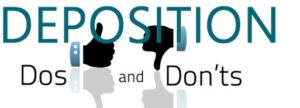Deposition Do’s and Don’ts for Fact Witnesses is Focus of latest GBA Best Practices

Deposition Do’s & Don’ts for Fact Witnesses is Focus of Latest GBA Best Practices
Lawsuit. Interrogation. Sworn testimony. All intimidating words that most people don’t like to hear. But as a geoprofessional, it’s possible that at some point in your career you will be asked to testify in a lawsuit as a fact witness. Typically, this will include a deposition, and it can be helpful (and far less intimidating) to know what to expect when you’re walking through the legal process. Enter the latest GBA Best Practices monograph, Deposition Do’s and Don’ts for Fact Witnesses.
Developed by GBA’s Legal Affairs Committee, the publication gives a brief overview of the deposition and its role/function in a lawsuit, a description of your job as a fact witness, and offers helpful tips like what to expect during your deposition, how to prepare beforehand, and what to do (and not do) during questioning.
“In its purest form, a fact witness is a person who testifies about what is perceived by the five senses. What do you know based on your contribution, knowledge, or presence?” It goes on to say, “Typically, depositions provide the greatest amount of information about relevant case facts, and often as importantly, as to a witness’ credibility, demeanor, and effectiveness.” Always tell the truth, avoid volunteering information and being conversational, and never make assumptions are just a few of the tips explained in the latest publication.
While there is no substitute for extensive discussion with your lawyer about how to approach your deposition, the concepts discussed in the newest GBA Best Practices can be used as a guide for both understanding the legal process and your role in it, as well as providing a brief overview of what to expect during your deposition.